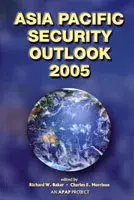Error message

The great tsunami of December 26, 2004, which took a quarter of a million lives in Southeast and South Asia, provided an overwhelming demonstration of the basic frailty of human security even in an era of high technology and nearly instant communication. The combined toll from natural disasters, disease, and persistent poverty even in the midst of impressive growth undermines the most fundamental sense of human security virtually throughout the Asia Pacific Region.
A number of more traditional security issues are also contributing to a generally more uncertain and potentially volatile security outlook for 2005. These include the continuing slow-motion crisis over North Korea's nuclear program and other potential proliferation of weapons of mass destruction; further terrorist attacks combined with the forces of radical Islamism and regional rebellion that threaten numerous countries in the region; and some stresses in the relations of major regional powers including China's relations with the United States (especially over Taiwan) and Japan. On the positive side, the governments of the region are engaged in an intense and virtually continuous dialogue over regional security issues, and practical steps are being taken to strengthen cooperation such as in patrolling the Strait of Malacca in addition to the impressive regional and international response to the tsunami. Still, the most pervasive element of the security outlook for the coming year is the sheer unpredictability of events.
This ninth annual edition of the Asia Pacific Security Outlook provides assessments of the security environment, defense issues, and regional and global cooperation from the perspectives of countries that participate in the ASEAN Regional Forum. Based on the work and expertise of a multinational team of security analysts and written for generalists and specialists alike, the Outlook is the most concise and authentic comparative work in this field. It also includes thematic essays on human security and the peace process in South Asia.
The Outlook is the principal product of the Asia Pacific Agenda Project, and is sponsored by the ASEAN Institutes for Strategic and International Studies, East-West Center, and Japan Center for International Exchange.
© 2005 Japan Center for International Exchange. All rights reserved.
CONTENTS:
- Foreword
- Charles E. Morrison, President, East-West Center, United States
- Jusuf Wanandi, Chairman of the Supervisory Board, Centre for Strategic and International Studies, Indonesia
- Yamamoto Tadashi, President, Japan Center for International Exchange, Japan
- Regional Overview
- Charles E. Morrison, President, East-West Center
- Richard W. Baker, Special Assistant to the President, East-West Center
SUBREGIONAL THEMES- 1 Human Security in Asia Pacific
- Charles E. Morrison, President, East-West Center
- 2 South Asia: Focus on India-Pakistan Relations
- Mallika Joseph, Assistant Director, Institute of Peace and Conflict Studies, New Delhi
COUNTRY CHAPTERS- 3 Australia
- Ross Cottrill, Australian Institute of International Affairs, Canberra
- 4 Brunei Darussalam
- Pushpathavi Thambipillai, University of Brunei Darussalam
- 5 Canada
- Allen G. Sens and Brian L. Job, University of British Columbia, Vancouver
- 6 China
- Chu Shulong, Tsinghua University, Beijing
- 7 European Union
- Martin Wagener, University of Trier, Germany
- 8 Indonesia
- Philips Vermonte, Centre for Strategic and International Studies, Jakarta
- 9 Japan
- Jimbo Ken, Keio University
- 10 Republic of Korea
- Kim Sung-han, Institute of Foreign Affairs and National Security
- 11 Malaysia
- Elina Noor, Institute of Strategic and International Studies, Kuala Lumpur
- 12 Mongolia
- Bayarmagnai Toinkhuu, Institute for Strategic Studies, Ulaanbaatar
- 13 New Zealand
- Peter Cozens, Centre for Strategic Studies, Victoria University of Wellington
- 14 Papua New Guinea
- Ronald May, Australian National University, Canberra<
- 15 Philippines
- Noel M. Morada, Institute for Strategic and Development Studies, Quezon City
- 16 Russia
- Sergey Sevastyanov, Vladivostok State University of Economics
- 17 Singapore
- Yeo Lay Hwee, Singapore Institute of International Affairs
- 18 Thailand
- Sakkarin Niyomsilpa, Institute of Security and International Studies, Bangkok
- 19 United States
- Richard W. Baker, East-West Center
- 20 Vietnam
- Hoang Anh Tuan, Research Institute for International Relations, Hanoi
- List of Abbreviations
- The APSO Project Team
- Index
The great tsunami of December 26, 2004, which took a quarter of a million lives in Southeast and South Asia, provided an overwhelming demonstration of the basic frailty of human security even in an era of high technology and nearly instant communication. The combined toll from natural disasters, disease, and persistent poverty even in the midst of impressive growth undermines the most fundamental sense of human security virtually throughout the Asia Pacific Region.
A number of more traditional security issues are also contributing to a generally more uncertain and potentially volatile security outlook for 2005. These include the continuing slow-motion crisis over North Korea's nuclear program and other potential proliferation of weapons of mass destruction; further terrorist attacks combined with the forces of radical Islamism and regional rebellion that threaten numerous countries in the region; and some stresses in the relations of major regional powers including China's relations with the United States (especially over Taiwan) and Japan. On the positive side, the governments of the region are engaged in an intense and virtually continuous dialogue over regional security issues, and practical steps are being taken to strengthen cooperation such as in patrolling the Strait of Malacca in addition to the impressive regional and international response to the tsunami. Still, the most pervasive element of the security outlook for the coming year is the sheer unpredictability of events.
This ninth annual edition of the Asia Pacific Security Outlook provides assessments of the security environment, defense issues, and regional and global cooperation from the perspectives of countries that participate in the ASEAN Regional Forum. Based on the work and expertise of a multinational team of security analysts and written for generalists and specialists alike, the Outlook is the most concise and authentic comparative work in this field. It also includes thematic essays on human security and the peace process in South Asia.
The Outlook is the principal product of the Asia Pacific Agenda Project, and is sponsored by the ASEAN Institutes for Strategic and International Studies, East-West Center, and Japan Center for International Exchange.
© 2005 Japan Center for International Exchange. All rights reserved.
CONTENTS:
- Foreword
- Charles E. Morrison, President, East-West Center, United States
- Jusuf Wanandi, Chairman of the Supervisory Board, Centre for Strategic and International Studies, Indonesia
- Yamamoto Tadashi, President, Japan Center for International Exchange, Japan
- Regional Overview
- Charles E. Morrison, President, East-West Center
- Richard W. Baker, Special Assistant to the President, East-West Center
SUBREGIONAL THEMES- 1 Human Security in Asia Pacific
- Charles E. Morrison, President, East-West Center
- 2 South Asia: Focus on India-Pakistan Relations
- Mallika Joseph, Assistant Director, Institute of Peace and Conflict Studies, New Delhi
COUNTRY CHAPTERS- 3 Australia
- Ross Cottrill, Australian Institute of International Affairs, Canberra
- 4 Brunei Darussalam
- Pushpathavi Thambipillai, University of Brunei Darussalam
- 5 Canada
- Allen G. Sens and Brian L. Job, University of British Columbia, Vancouver
- 6 China
- Chu Shulong, Tsinghua University, Beijing
- 7 European Union
- Martin Wagener, University of Trier, Germany
- 8 Indonesia
- Philips Vermonte, Centre for Strategic and International Studies, Jakarta
- 9 Japan
- Jimbo Ken, Keio University
- 10 Republic of Korea
- Kim Sung-han, Institute of Foreign Affairs and National Security
- 11 Malaysia
- Elina Noor, Institute of Strategic and International Studies, Kuala Lumpur
- 12 Mongolia
- Bayarmagnai Toinkhuu, Institute for Strategic Studies, Ulaanbaatar
- 13 New Zealand
- Peter Cozens, Centre for Strategic Studies, Victoria University of Wellington
- 14 Papua New Guinea
- Ronald May, Australian National University, Canberra<
- 15 Philippines
- Noel M. Morada, Institute for Strategic and Development Studies, Quezon City
- 16 Russia
- Sergey Sevastyanov, Vladivostok State University of Economics
- 17 Singapore
- Yeo Lay Hwee, Singapore Institute of International Affairs
- 18 Thailand
- Sakkarin Niyomsilpa, Institute of Security and International Studies, Bangkok
- 19 United States
- Richard W. Baker, East-West Center
- 20 Vietnam
- Hoang Anh Tuan, Research Institute for International Relations, Hanoi
- List of Abbreviations
- The APSO Project Team
- Index





